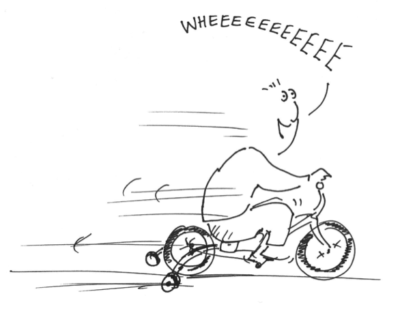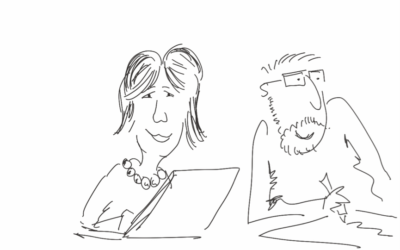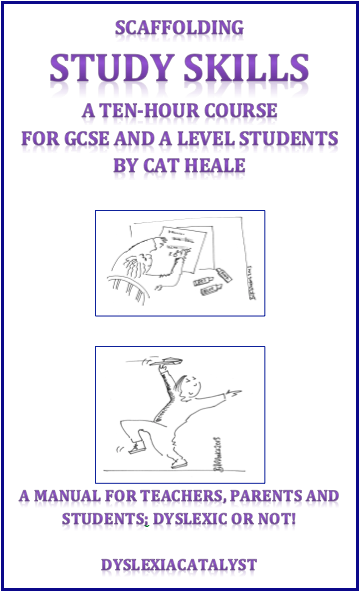
(The manual is coming soon!)
So what do you need to know to help you study? It’s a bit like riding a bike, you need a helping hand and some ‘stabilisers’ (skills) to help you learn at your best.
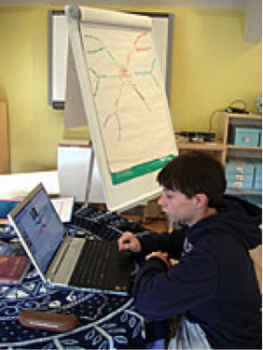 Some children seem to learn these skills as if by ‘magic’, but a lot of children need to be taught them and practice them, until they are automatic!
Some children seem to learn these skills as if by ‘magic’, but a lot of children need to be taught them and practice them, until they are automatic!
Things to think about!
All of these areas will be explained fully and you will have a chance to practice the skills in the manual.
-
Getting Ready to Learn
-
You need to take a good look at and evaluate your strengths and weaknesses (and use your strengths to help you succeed)
-
Goal Setting: write out your short and long term goals, keep them pinned up in front of your desk.
-
Make sure you have a well-organized work-space.
-
Have all the resources/stationery you need, to hand.
-
-
Learning about Learning
-
You need to work out WHAT helps you learn.
-
Decide which learning style suits you best. Do you learn best by seeing things, hearing information, reading and writing it or do you need to do it/act it/feel it?
-
Think of HOW you learn, what helps your memory to remember (and what doesn’t)
-
Think about WHEN it is best for you to learn.
-
-
Being Organised
-
Sometimes it is difficult to get started, do not put work off!
-
Be organised about what you need for school every day.
-
Be organized about what you need to bring home, especially homework.
-
Make lists/record reminders.
-
Work out what you need to do (task list) and work out realistically how much time you have to do it in.
-
-
Learn how to Read
-
Look at the section on reading.
-
Read in ways that help you remember.
-
-
Learn how to take Notes
-
There are many ways to take notes, some will work better for you than others.
-
Try some of these: key words, abbreviations, high-lighting, bullet points, drawings, diagrams, mind maps, record.
-
-
How to make Vocabulary lists
-
Collect linking words
-
Create lists of synonyms (other words meaning the same eg. said/ whispered/roared).
-
From the books you are reading, make lists of good words and phrases.
-
Have a list of academic-sounding words/phrases like: ‘on the other hand, it can be seen, in conclusion’.
-
If you have to write an essay, collect topic words that you can use and spell correctly.
-
Use these words in your writing.
-
-
How to Write Creatively (fiction) and Non-fiction
-
Look at the section on writing stories.
-
Look at the section on writing essays.
-
-
See what IT helps you learn
-
Look at the IT section
-
Realise that to use the IT software effectively, you really must learn to touch type! (boring but so important)
-
Touch-type Read and Spell (TTRS) allows you to try it first to see if it works for you.
-
-
Homework and how to Present your work
-
Make a plan, get organized, put the timer on and get working!
-
Put in exercise breaks, get fresh air, drink water and eat nuts/carrots and things that don’t drain you of energy.
-
Make sure the work you hand in is of good quality, either neat handwriting (skipped lines can help) or typed.
-
-
How to Revise
-
There are many ways to revise but unless you are very lucky it is unlikely that you remember just by reading the information and re-writing notes.
-
You need to make notes where you have to engage your brain and think!
-
Make you revision multi-sensory.
-
Use the computer to make neat, effective revision notes. Even using WORD can work really well, with bullet points, different coloured fonts etc.
-
Start early in the year, do not leave it until the revision period. There is too much to learn in too short a time!
-
Make revision fun/funny, you are more likely to do it!
-
-
How to do Tests and Exams
-
Revise well, so you know the subject.
-
Look at the timing of the exam and work out how much time each question needs. Write it on the paper.
-
Highlight key words in the question to make sure you answer it properly.
-
Make a mini plan to keep you on track, for each question.
-
Write carefully and thoughtfully, quality over quantity!
-
Leave time to proofread.
-
GOOD LUCK!
-
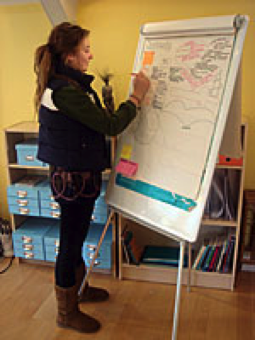 Mind mapping for A Level
Mind mapping for A Level
